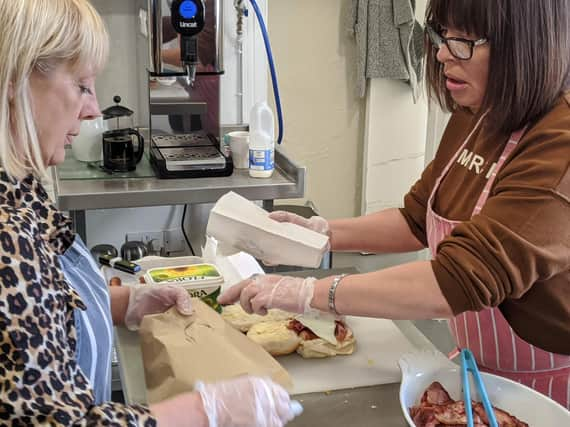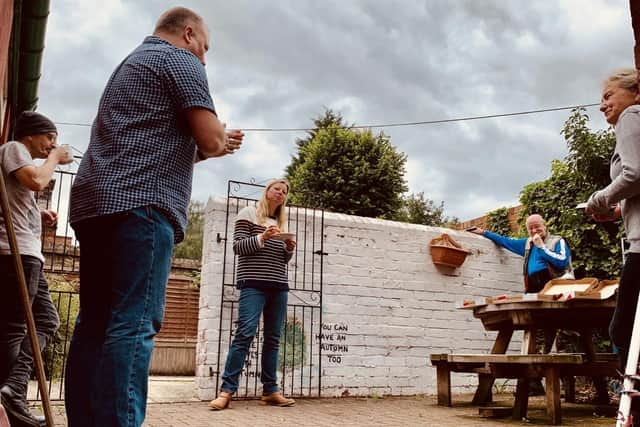Support to stay sober - How Yorkshire charity has been helping people affected by alcohol use during the pandemic


Ruth Brown had only turned to Project 6, a charity whose work includes supporting people affected by substance use, for a matter of weeks before the country was placed into lockdown as a result of the coronavirus pandemic in March.
The decision meant the organisation, which has bases in Keighley, Sheffield and Doncaster, moved many of its services online - and for Ruth, it is no exaggeration to say that the opportunity to continue to engage virtually has changed her life.
Advertisement
Hide AdAdvertisement
Hide AdAlmost daily, the 63-year-old who lives in Sheffield has taken part in wellbeing sessions or peer support groups focused around alcohol recovery. With the help of these - and the friends she has made - she has maintained sobriety during the pandemic, last having a drink more than a year ago, in September 2019.


“It’s kept me focused joining in and knowing that I can’t have a drink,” she says. “I’ve made some really nice friends too and I call them friends. I know there’s at least four people who I could ring and say I’m having a [rubbish] day or I want to have a drink and they’d talk to me and that’s great.”
Ruth’s drinking began to become problematic after losing her husband to cancer six years ago. Though she’d “always liked a drink”, things began to spiral.
“I thought I was dealing with it but I wasn’t really. I was drinking quite heavily,” she reflects. “As time went on, I just found my whole life was revolving around when I could have a drink to the point where it overtook everything. When I woke up I’d think what am I doing today, when can I have a drink? I tried to stop on several occasions and did for a few days or some weeks but then I’d go back to it.”
Advertisement
Hide AdAdvertisement
Hide AdRuth would pick up a bottle as soon as she returned home from work. When she left her job after a period of sick leave due to anxiety, the drinking became only more problematic.
“Then I’d got all this time on my hands - perhaps not as much money - but I was drinking. If I wasn’t doing anything in the day, I might open a bottle of wine at 11 o’clock. It just got out of hand.”
There was nothing particularly memorable about the day in 2018 when she woke up and questioned “what am I doing?” but it was the start of a journey that led to her eventual sobriety.
She contacted Sheffield’s NHS alcohol service and also referred herself to Drink Wise, Age Well, a service that was running in the city which aimed to help people make healthier choices about their drinking as they aged.
Advertisement
Hide AdAdvertisement
Hide AdFor a long time, Ruth says she did nothing but listen at the peer support groups she attended, continuing to drink. But after “gelling” with one of the facilitators, she had a moment of realisation that she needed to stop, and with the help of the group and her GP, she put a halt to her drinking.
“You could sit in a meeting and somebody would come in and say I had to go to hospital last weekend after I collapsed in the garden...You could sit there and think that’s never happened to me, I can’t be that bad, I’ve never had to call an ambulance, I’ve never had a blackout,” Ruth says. “The facilitator used to say yeah you’ve never had a blackout - yet. I think that was the main tool that helped me, thinking of what could happen. I’ve not got liver failure - yet. I’ve not been sectioned - yet.”
Ruth turned to Project 6 for support in February ahead of the Drink Wise, Age Well service in Sheffield coming to an end in March. With the charity, she’s completed online training and is now a volunteer herself, co-facilitating a number of groups.
"The [group facilitators] at Project 6 have been there in the background and I know that if I’m struggling I’ve only got to ring them,” she says. “I am so grateful for the services and support I’ve had. I don’t know where I would have been without them. If I can give something back and help somebody else that’s enough for me. That’s worth not having a drink for.”
Advertisement
Hide AdAdvertisement
Hide AdProject 6, which is made up of more than 50 paid staff and over 100 trained volunteers, is currently running a mixture of virtual and face-to-face services. People can refer themselves for support and in some cases, referrals are made from healthcare providers such as hospitals and GPs.
The impact of Covid-19 has been stark. The charity says across alcohol services in Sheffield and Keighley, it would have expected to have worked with 335 people in the period since the pandemic took hold in March, but has actually supported 920, an increase of 174 per cent. It says drinking has increased among some areas of the population and that the rise is likely to continue.
Scott Richards, a recovery worker in Sheffield, says July saw three times as many people as is typical accessing Project 6 in the city. At the moment, group meetings, virtual or in person, are attended by an average of 20 people, up from around seven before the pandemic began.
“I think [the pandemic] has shone a spotlight on how serious some people’s drinking was,” he reflects. “I think some people were getting away with it a bit, able to hide it, drinking on the way back from work. But I think in lockdown, partners and children maybe have realised how significant a member of their family’s drinking is.”
Advertisement
Hide AdAdvertisement
Hide AdSome people have turned to alcohol out of boredom or to cope with the pressures of daily life, he says. For many, these challenges have been enhanced by work, financial, relationship and health strains brought about by Covid-19 and the restrictions to try to manage it.
For others, a change in pace of life that has ensued from the virus has actually been an opportunity to seek help. “For a lot of people, they’ve had such a hectic lifestyle and they’ve been wanting to refer for a while but just haven’t found time,” Scott says. “Also, we’ve found some people are a lot more willing to do groups when they’re sat in their own home.”
As well as offering drug and alcohol support, Project 6 runs training programmes to help people overcome barriers to education, training or employment; supports families and young people with wellbeing, resilience and mental health; and runs a service for people who feel they are at crisis point, partnering with organisations who specialise in areas including health and wellness, welfare benefits and domestic violence.
During the initial lockdown period, it saw a 400 per cent increase in calls to its Keighley crisis service, with more than 70 per cent relating to food poverty. Project worker Janet Thompson witnessed that first hand. She works on the Third Place programme, a scheme that supports street drinkers. It aims to remove barriers to their engagement with treatment by providing access to showers, laundry facilities and hot meals and drinks.
Advertisement
Hide AdAdvertisement
Hide Ad“What we try and do is gain trust as that’s really important,” Janet says. “If they don’t believe in us, we’ll get nowhere. The aim then is to talk to them about safe levels of drinking, the impact on health, long-term issues and also show them ways that things can improve and give them a bit of hope that things can get better and their life and social situation can change with a bit of help and support.”
During the height of the lockdown, Project 6 continued to help street drinkers by providing food parcels and has since operated a Covid-secure breakfast club for small groups at a time.
Janet says people not signed up to the service also turned to Project 6 through lockdown, wanting help with food provision. “It was just a case of doing what we can to help people through,” she says.
Like a number of Project 6’s staff and volunteers, she has sought support herself for alcohol use. “Project 6 saved my life,” she says. “After years of drinking socially the rot set in and progressively over about ten years, I became a dependant drinker, nearly losing everything including my self-esteem and the will to live.”
Advertisement
Hide AdAdvertisement
Hide AdShe turned to Project 6 for help on two occasions and says with non-judgemental help and empathy, she was able to put down the drink for good. “I realised I was not alone and was able to look at the negative things in my life and deal with my problems and find peace of mind,” she says. “Ultimately, I had a reason for living again after learning to like myself, put the past to rest, bury the shame and forgive myself.
“Project 6 supported me to find the strength to value myself and get my life back on track. I feel extremely lucky and proud to work for Project 6 and I hope my story will inspire others to find the courage to reach out even when they feel there is no hope - don’t give up.”
“We’ve got people who have got back into work, kept relationships together, got their children back,” Scott adds. “We help people with education, getting sober, rebuilding families and linking back into communities.”
As for Ruth, now knowing the positive impact on her happiness and relationships with family and friends, she wishes she had reached out earlier and felt able to be more honest about the scale of her drinking.
Advertisement
Hide AdAdvertisement
Hide Ad“So many different people from different walks of lives have a problem [with drink] and it doesn’t discriminate,” she says. “If I’d been diagnosed with diabetes, I wouldn’t be ashamed to tell people that and I really think we’ve got to get rid of the stereotypes.”
Visit project6.org.uk
Support The Yorkshire Post and become a subscriber today.
Your subscription will help us to continue to bring quality news to the people of Yorkshire. In return, you'll see fewer ads on site, get free access to our app and receive exclusive members-only offers.
So, please - if you can - pay for our work. Just £5 per month is the starting point. If you think that which we are trying to achieve is worth more, you can pay us what you think we are worth. By doing so, you will be investing in something that is becoming increasingly rare. Independent journalism that cares less about right and left and more about right and wrong. Journalism you can trust.
Thank you
James Mitchinson